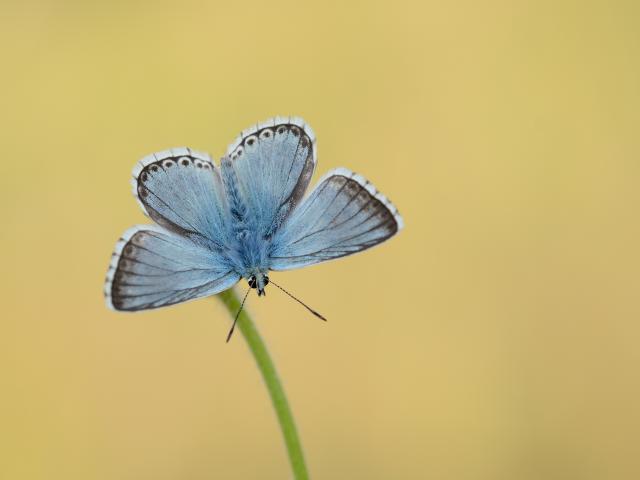Paloma Oteo Golderos, a biologist from the University of Granada in Spain, has spent the summer working with Butterfly Conservation as part of an Erasmus traineeship. Here she explains why she swapped the Sierras for the seaside on the hunt for butterflies.
Two years ago, I started working with butterflies in my university’s zoology department as an intern student. For my final year, I undertook a project on the feeding preferences in two species of white butterfly. I told my supervisor that I would like to do a traineeship in something related to conservation and she was the one who recommended Butterfly Conservation (BC).
I made contact with BC and had the luck of working with Dr Caroline Bulman (Head of Species Ecology) based at the UK Head Quarters in Dorset. Within Caroline’s team, I was assigned to the study of the distribution and abundance of the lovely butterfly Chalk Hill Blue Polyommatus coridon, whose population is declining in Dorset. Caroline and I developed a project plan and I set out to look at the current and previous distribution of the species within the Isle of Purbeck. I made different trips to the areas where these butterflies had been found years before and I also worked in the office, documenting research about this species and writing a report. Nobody told me that going for a walk in the beautiful Dorset landscapes was going to be working.
Sadly the conclusions of my study are that the Chalk Hill Blue Butterfly is struggling in Dorset. Previously the butterfly was found from Durlston, Swanage in the far west of the Isle of Purbeck and along the chalk ridge with strong populations on the Isle of Portland. During my study, we visited all sites in Purbeck in good weather conditions and found Chalk Hill Blue present only at Lulworth Cove and the Isle of Portland. Interestingly, this summer has seen the colonisation of the Weymouth Relief Road by the butterfly. It was fantastic to see the species on a man-made infrastructure project. The next step for BC is to try to understand what is happening and how this species can thrive again once more along in the Isle of Purbeck and beyond.

My main concerns when arriving in England (apart from speaking English) was the weather and the mistaken idea that the English were not very friendly. But I was lucky, in terms of the weather, it coincided with the fact that this summer was an exception and it was very hot, which for me was a perfect temperature but for the English people here it was a suffocating heat. And with regard to the people, I could not be more wrong. This experience has been so positive thanks to all the wonderful people I have met here and especially to my colleagues in the BC office. They have provided me with many facilities and numerous different experiences that have allowed me to see many of the areas in which BC works. I have experienced the variety of habitats of many butterflies and moths and the conservation measures that are carried out to support them, the tools to analyse the data and the different schemes of education that take place in schools. Therefore, I must thank the entire BC office for all the attention and help they have given me, making me feel at home. I am especially grateful to Caroline Bulman, who has been the person who has guided me in my work in BC and has looked after me during my entire stay- making sure I did not miss anything.
I believe that this experience has been totally enriching, in which besides improving my English, I have learned many things that have allowed me to continue training as a biologist. In this way, I return to Spain with many ideas to continue working in conservation and butterflies and wanting to return to England.


